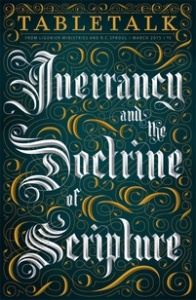Why It’s Essential by Michael Kruger | Reformed Theology Articles at Ligonier.org.
 Yesterday before worship services I finished reading through my March Tabletalk, including the final articles on this month’s theme, “Inerrancy and the Doctrine of Scripture.”
Yesterday before worship services I finished reading through my March Tabletalk, including the final articles on this month’s theme, “Inerrancy and the Doctrine of Scripture.”
The first of these final articles is by Dr. Michael Kruger (professor of NT at Reformed Theological Seminary in Charlotte, NC) and titled “Why It’s [Inerrancy] Essential.” One of the things he does in his article is answer various objections that have been raised in the Christian academic world against the doctrine of inerrancy. I find this form of apologetics to be most helpful, and include here for your benefit one such objection that he answers (for the full article, follow the Ligonier link above).
3. Inerrancy is not taught by the Bible itself. Some have suggested that there is no exegetical argument for inerrancy, but only a theological one based on the fact that God is a God of truth and cannot lie. Who are we (so the argument goes) to determine what kind of book God could or could not inspire? But again, this argument proves to be a straw man.
First, there is nothing inappropriate about theological arguments—some doctrines flow naturally from other doctrines that we already believe. For instance, many of our beliefs about the Trinity are not based on simple proof-texting, but are pieced together from a variety of theological considerations (for example, God is one, yet Jesus is God). If we believe the Bible is the very Word of God—that is, when Scripture speaks, God speaks—then it follows that the contents of the Bible are truthful. One need only consider Jesus’ own view of the Old Testament. Time and again, Jesus appeals to Old Testament passages and always receives it as truth, never correcting it, criticizing it, or pointing out inconsistencies. Indeed, He not only refrained from correcting the Scriptures, but He also affirmed the Scriptures “cannot be broken” (John 10:35), and that “[God’s] Word is truth” (John 17:17). It is unthinkable that Jesus would ever have read an Old Testament passage and declared, “Well, this passage is simply wrong.”
A second beneficial article I read on this subject is that which immediately follows Krugers in the magazine, “Just Me and My Bible?” by Rev.Terry Johnson (pastor of Independent Presbyterian Church in Savannah, GA). In this interesting article Johnson shows that the Reformed faith too has a healthy regard for the church’s tradition (contra Rome, but understood properly), most prominently in her creedal heritage, when it comes to understanding the Bible.
I also leave you with a portion of his article, encouraging you to read the rest at the link above (at his title).
Bible study is meant to take place in an ecclesiastical context, one that stretches back to the Apostles. We read Scripture in light of what properly ordained pastor teach, but also in light of what the creeds and councils, the confessions and theologians—of the catholic (universal) and Reformed tradition—have taught. Too many contemporary Christians barely hide their contempt for “traditional ways of doing things.” By way of contrast, Paul urges the Corinthians to “maintain the traditions even as I delivered them to you” (1 Cor. 11:2; see 2 Thess. 2:15; 3:6). He urges them to maintain not merely the “message,” the “good news,” the “teaching,” the “instruction,” or the “commandment,” but the “tradition.” In the immediate context, Paul is talking about the infallible Apostolic tradition that we know today as the New Testament. Still, there is a secondary application—those who have gone before us could err and have erred, but it is wise for us to give the benefit of the doubt to the great men and women of God who interpreted the Bible before us.
This tradition is the interpretive or exegetical heritage of those who hold to the Reformed faith. I am to read my Bible not in isolation, but in consultation with that heritage, its teachers (both alive and deceased), and its implications for theology, ecclesiology, ethics, worship, and family life. What did our ecclesiastical ancestors say about a given passage of Scripture? What was their consensus on a given doctrinal theme? A given church practice? Humility demands that we go beyond “just me and my Bible” as we seek to be faithful in our generation.